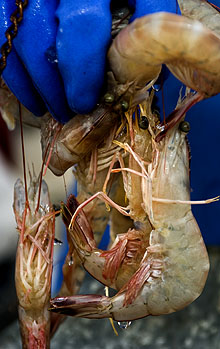Seafood: If It Smells Good, Eat It
Louisiana seafood is “absolutely” safe to eat, says Tulane toxicologist LuAnn White, despite public fears regarding contamination after the catastrophic Gulf oil spill.

A vendor weighs Louisiana shrimp at the Crescent City Farmers Market. Though prices of Louisiana seafood are rising, toxicologist LuAnn White says it's safe to eat. (Photo by Paula Burch-Celentano)
“Certainly, the spill could have a major ecological and economical impact on our fisheries,” says White, director of the Tulane Center for Applied Environmental Public Health, part of the Tulane School of Public Health and Tropical Medicine. “However, the state health department is doing everything it can to make sure that this doesn't become a human health issue.”
The state's seafood monitoring program closes fishing areas where oil is sighted, chemically tests thousands of seafood specimens and performs sensory analysis to detect any contamination at docks and processors. This three-tier line of defense makes contamination unlikely in anything that gets to market, according to White.
“There may be shortages in Louisiana seafood, because prime areas are not being fished right now,” she says. “But any fish, oyster, crab or shrimp that gets to a restaurant or grocery store is safe, and the quality will be the same, or maybe even better.”
Even so, the sniff test remains the “gold standard” for detecting seafood, White says.
“The human nose is actually the best oil detection tool we have available,” she says. “If the seafood was contaminated, you would smell and taste the oil.”
Previous spills in Oregon and Texas have shown that increased levels of hydrocarbons in seafood did little harm because concentrations were low. Even if tainted fish is eaten, the oil is not highly toxic and someone would have to eat “tons” of seafood over decades to experience harm, according to White.
“You may get a stomach ache, but the oil actually isn't highly toxic,” she says. “It's like your grandmother told you 'If it doesn't smell good, don't eat it.'”
Laura Horne is communications coordinator for the Tulane University School of Public Health and Tropical Medicine.
